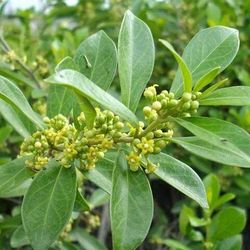Gymnema Sylvestre
Other Names : Gemnema Melicida, Gimnema, Gur-Mar, Gurmar, Gurmarbooti, Gymnema montanum, Gymnema sylvestre, Gymnéma, Gymnéma Sylvestre, Madhunashini, Merasingi, Meshashringi, Miracle Plant, Periploca sylvestris, Shardunika, Vishani. Gymnema is a woody climbing shrub native to India and Africa. The leaves are used to make medicine. Gymnema has a long history of use in India’s Ayurvedic medicine. The Hindi name, gurmar, means "destroyer of sugar."
Special Precautions of Gymnema Sylvestre
- Pregnancy and breast-feeding: Not enough is known about the safety of using gymnema during pregnancy and breast-feeding. Stay on the safe side and avoid use.
- Diabetes: Gymnema can affect blood sugar levels in people with diabetes. Watch for signs of low blood sugar (hypoglycemia) and monitor your blood sugar carefully if you have diabetes and use gymnema.
- Surgery: Gymnema might affect blood glucose levels and could interfere with blood sugar control during and after surgical procedures. Stop using gymnema at least 2 weeks before a scheduled surgery.
The benefits of Gymnema Sylvestre are
Today, gymnema is used for diabetes, metabolic syndrome, weight loss, and cough. It is also used for malaria and as a snake bite antidote, digestive stimulant, laxative, appetite suppressant, and diuretic. How does it work? Gymnema contains substances that decrease the absorption of sugar from the intestine. Gymnema may also increase the amount of insulin in the body and increase the growth of cells in the pancreas, which is the place in the body where insulin is made.
- Diabetes. Developing research suggests that taking a specific gymnema extract (GS4) by mouth, in combination with insulin or diabetes medications, can enhance blood sugar reduction in people with type 1 or type 2 diabetes.
- Metabolic syndrome.
- Weight loss : Its molecules mimic glucose and fool the taste bud receptors on the tongue enough to convince people they have had enough sugar.
- Stimulating digestion.
- Malaria.
- Cough.
- Snake bites.
- Softening the stool (laxative).
- Increasing urine excretion (diuretic).
Combinations
- Cholesterol : Gymnema Sylvestre + Red Yeast
- Too much triglycerides : Gymnema Sylvestre + Fish Oil
- Hypertension : Gymnema Sylvestre + Garlic or Olive leaf
